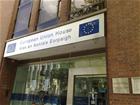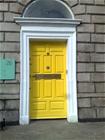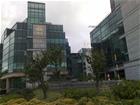Is the Celtic Tiger Coming Back?
Adelina Marini, January 4, 2013
 Ireland's turn to head the Council of the EU (for a seventh time) as of the beginning of 2013 is quite a timely one. On the one hand, in 2013 Ireland marks 40 years of EU membership which can serve as a very good illustration to what the EU can do with countries that know precisely what they need and have the will to pursue it. On the other - Ireland is the first of the three programme countries in the eurozone that has returned to the financial markets, it excels in handling the conditions under the bailout and there is all likelihood the country to soon forget the troubles, provided the circumstances in the euro area and the EU at large allow that. And Ireland vows that it will try very hard.
Ireland's turn to head the Council of the EU (for a seventh time) as of the beginning of 2013 is quite a timely one. On the one hand, in 2013 Ireland marks 40 years of EU membership which can serve as a very good illustration to what the EU can do with countries that know precisely what they need and have the will to pursue it. On the other - Ireland is the first of the three programme countries in the eurozone that has returned to the financial markets, it excels in handling the conditions under the bailout and there is all likelihood the country to soon forget the troubles, provided the circumstances in the euro area and the EU at large allow that. And Ireland vows that it will try very hard.
And although the rotation presidencies since the Lisbon Treaty are not what they used to be, nonetheless the role of a country, no matter how big it is, can leave a trace. Such was the case with Poland's debut, for instance, when Warsaw succeeded in its fight to ensure in the fiscal compact the non-eurozone countries to get adequate treatment. Ireland vows to fight for the banking union. Dublin was very disappointed with the developments in 2012 when in June the strategic decision was taken for the  establishment of a banking union, the foundations of which was to be laid by allowing the permanent rescue fund of the euro area to directly recapitalise troubled banks in the eurozone. A condition for that was the creation of a single supervisory mechanism for banks, which was about to fail, but on December 11th it has been agreed by the EU finance ministers.
establishment of a banking union, the foundations of which was to be laid by allowing the permanent rescue fund of the euro area to directly recapitalise troubled banks in the eurozone. A condition for that was the creation of a single supervisory mechanism for banks, which was about to fail, but on December 11th it has been agreed by the EU finance ministers.
Ireland was explicitly mentioned in the conclusions of the leaders on June 29th, where it was written that countries with sound fiscal discipline should benefit from the scheme, inspired mainly by the situation with Spanish banks. "As an EU/IMF programme country, Ireland continues to negotiate with the troika to improve the conditions of our bailout, and, in particular, to reach agreement on the problem of our banking debt – which must be resolved before March", wrote in a series of articles for various big European newspapers Eamon Gilmore, Ireland's deputy prime minister and minister of foreign affairs and trade. The EU leaders have agreed at their last for 2012 summit the framework for direct recapitalisation to be established by March this year.
According to the last for 2012 programme review of the Troika, the economic recovery will be gradual in 2013 with expected economic growth of 1.1% of GDP and 2.2% in 2014. Public debt is expected to peak to 122% of GDP this year. The main  problem, however, is that this forecast could be significantly changed due to the risk of weaker growth in Ireland's trade partners. If growth remains weak in the upcoming years, it could lead again to the need to recapitalise banks. "At the same time, we will continue to advance measures to enhance Europe’s financial stability, pushing ahead with the talks on banking union – which is vital for Ireland. The development of the banking union structure provides a basis for Ireland to secure investment by the European Stability Mechanism in Ireland's banks", Eamon Gilmore writes.
problem, however, is that this forecast could be significantly changed due to the risk of weaker growth in Ireland's trade partners. If growth remains weak in the upcoming years, it could lead again to the need to recapitalise banks. "At the same time, we will continue to advance measures to enhance Europe’s financial stability, pushing ahead with the talks on banking union – which is vital for Ireland. The development of the banking union structure provides a basis for Ireland to secure investment by the European Stability Mechanism in Ireland's banks", Eamon Gilmore writes.
Thanks to the EU or in spite the EU?
This is the dilemma a lot of countries, politicians and citizens are facing. A dilemma which, however, does not exist for Eamon Gilmore, despite the current problems Ireland has and which to some extent have been imported. In a special column for one of the big Irish daily newspapers, The Irish Times, Tánaiste Gilmore summarises the pluses of the 40-year long membership of his country to the EU. "Despite our recent problems, Ireland’s EU membership has driven our economic development over the past 40 years, helping our once underdeveloped economy to become one of the most successful hi-tech, exporting economies in the world". By the way, it is this analysis that is in the foundation of the big support Ireland has for the enlargement process. During the previous presidency of Ireland (in the first half of 2004), Bulgaria and Romania ended the accession negotiations with the EU and the 8 former communist countries plus Malta and Cyprus officially joined the EU.
Eamon Gilmore writes that although Ireland got its independence from the United Kingdom decades before it became a member of the European Community, the  economic dependence remained, which supported poverty in the country. Ireland then (and still) exported mainly agricultural produce, mostly to Britain which, however, maintained low food prices and the British economy was one of the slowest growing among the western economies. That upheld wages down in Ireland. With membership, things changed, the Tánaiste writes. Only for the period 1973-2008, the Irish farmers received 44 billion euros from the Common Agricultural Policy of the EU (CAP). And from the structural funds the country received over 17 billion euros, invested predominantly in improvement of road and public transport infrastructure.
economic dependence remained, which supported poverty in the country. Ireland then (and still) exported mainly agricultural produce, mostly to Britain which, however, maintained low food prices and the British economy was one of the slowest growing among the western economies. That upheld wages down in Ireland. With membership, things changed, the Tánaiste writes. Only for the period 1973-2008, the Irish farmers received 44 billion euros from the Common Agricultural Policy of the EU (CAP). And from the structural funds the country received over 17 billion euros, invested predominantly in improvement of road and public transport infrastructure.
But the biggest plus, though, Mr Gilmore continues, is the creation of the single market in 1993, which eliminated trade barriers and ensured freedom of movement of goods, services, workers and capital among the member states. Summarising, he points out that in 1993 the country's gross domestic product per capita was 70% of the EU average, while in the end of the century it was way above the average and that in spite the current problems. But that does not prevent many Irish to feel unsatisfied and betrayed. Ireland is among the countries with highest unemployment rates in the Union.  In the summer, the country was the fifth in the entire EU with highest unemployment - almost 15 per cent. In comments below Eamon Gilmore's article, there were opinions that the EU continued to dictate the economic future of the country.
In the summer, the country was the fifth in the entire EU with highest unemployment - almost 15 per cent. In comments below Eamon Gilmore's article, there were opinions that the EU continued to dictate the economic future of the country.
"It [EU] would, for example, have the power to coordinate how Member States tax their citizens—with the unspoken goal to alleviate tax competition between countries, a recurrent complaint by high-tax countries against their lower-tax brethren. Even in
the USA, the federal government doesn’t attempt to tell the states how to tax their residents. It would cause a revolt. Barroso, building on his idea of a United States of Europe, also wants to give the Commission, his Commission, the power to veto the
budgets of Member States. Imagine the White House vetoing California’s budget", one comment goes.
"It is strange that an Irish politician will boast / admit that these reforms have been  forced on us and would not have occurred had Irish politicians been left to their own devices", another one goes.
forced on us and would not have occurred had Irish politicians been left to their own devices", another one goes.
Among the other priorities which Dublin has in mind, are pursuing a comprehensive trade agreement with USA, which has already been discussed during Hillary Clinton's visit in Dublin in the end of 2012. Ireland believes that if there is such an agreement, it will lead to similar agreements with the other strategic partners of the EU, like Canada, Singapore and Japan, which will add some 2 per cent to the EU's gross domestic product.
 It is still too early to tell whether the Celtic tiger, as Ireland was known before the crisis, is coming back in the sense that was meant then - with dynamic growth and dropping unemployment. The Celtic tiger, however, can be recognised also in the successful example that the austerity programme, when implemented without much muttering, in a smart way, with consciousness that it is necessary, then it delivers. The power of the tiger can be seen also in Ireland's determination to cash down its membership in the EU for the past 40 years. As another comment goes in The Irish Times of a reader who left his homeland long ago, Ireland has radically changed and every time he goes home it looks different to the better. So, Fáilte, Éire! For a seventh time.
It is still too early to tell whether the Celtic tiger, as Ireland was known before the crisis, is coming back in the sense that was meant then - with dynamic growth and dropping unemployment. The Celtic tiger, however, can be recognised also in the successful example that the austerity programme, when implemented without much muttering, in a smart way, with consciousness that it is necessary, then it delivers. The power of the tiger can be seen also in Ireland's determination to cash down its membership in the EU for the past 40 years. As another comment goes in The Irish Times of a reader who left his homeland long ago, Ireland has radically changed and every time he goes home it looks different to the better. So, Fáilte, Éire! For a seventh time.
 Klaus Regling | © Council of the EU
Klaus Regling | © Council of the EU Mario Centeno | © Council of the EU
Mario Centeno | © Council of the EU Mario Centeno | © Council of the EU
Mario Centeno | © Council of the EU